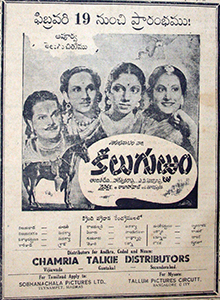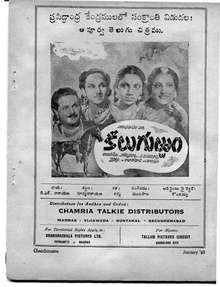Keelu Gurram
Keelu Gurram (transl. Magic Horse) is a 1949 Telugu-language swashbuckler film, produced and directed by Raja Saheb of Mirzapur under the Sobhanachala Pictures banner.[1] It stars Akkineni Nageswara Rao and Anjali Devi in the lead roles, with music composed by Ghantasala. The film is the debut of legendary music director and singer Ghantasala as composer.[2] This is also the first Telugu film dubbed into another language, Tamil as Mayakkudirai[3] The film was recorded as an Industry Hit at the box office.
| Keelu Gurram | |
|---|---|
 Theatrical release poster | |
| Directed by | Raja Saheb of Mirzapur |
| Produced by | Raja Saheb of Mirzapur |
| Written by | Tapi Dharma Rao (story / dialogues) |
| Screenplay by | Ch Narayana Murthy |
| Starring | Akkineni Nageswara Rao Anjali Devi |
| Music by | Ghantasala |
| Cinematography | D. L. Narayana |
| Edited by | R. M. Venu Gopal |
Production company | Sobhanachala Pictures |
Release date |
|
Running time | 172 minutes |
| Country | India |
| Language | Telugu |
Plot
The King of Vidarbha is attracted to a Yakshini called Guna Sundari (Anjali Devi) when he goes out hunting with his aide (Relangi). He brings her to his kingdom as his second wife. She is a demon who eats elephants and horses in the fort at night, leaving bones. According to her plan, she manages to shift the blame onto the Queen. The king punishes the pregnant queen and asks his commander to kill her by taking her into a forest. But the commander feels sorry for her. He does not kill her, but blinds her by removing her eyeballs and takes them as a proof that he killed her. He hands them over to Guna Sundari. She secretly keeps them with her sister.
She gives birth to a son Vikrama (Akkineni Nageswara Rao) and was rescued by forest dwellers. He grows up there without knowing his past and learns all the fighting skills. One day, because of a petty fight with the son of Chieftain of their tribe, he comes to know about his past through his mother. He leaves the forest without telling his mother.
In the kingdom, there is an announcement that the princess of the Anga kingdom was kidnapped by an unknown witch, if anybody finds and bring her back, they will be awarded half of the kingdom and the princess herself as a bride. Three intelligent people in the city, a fortune teller, a blacksmith, and a priest wish to win the reward. Through their magical powers, they find that the princess is hidden very far away across three oceans on a mountain surrounded by dangerous creatures. To reach there, they design a Mechanical horse (Keelu Gurram) which can fly. After they finish making it, they are afraid of riding on it. So they take it to the king and ask him if there is any brave young man in the kingdom who can ride on it.
Vikrama just reaches the kingdom and rides on Keelu Gurram (Mechanical horse), he wins the king's attention. He is also able to stop the Yakshini from eating the horses and elephants with the help of that horse. He was given the Sainyadhikari (Chief of Army) position due to his bravery. The Yakshini now finding it difficult to fulfill her wishes, wants to get rid of Vikrama somehow. She pretends that she has a severe headache and asks the king to send Vikrama to bring a medicinal herb for her headache. So he set on to the journey on his magical horse. On the way, he saves a queen (Lakshmirajyam), who is about to be killed by a cruel conjurer in order to possess great powers. He rests in her place for some time. She finds a small note in which it is written that "Dear elder Sister, whoever brings this letter to you, is causing me a lot of trouble. As soon as he hands over this letter to you, gobble him up". She suspects something and changes the letter so that he will be treated well by her.
Vikrama tricks her and gets hold of the princess, his mother's eyeballs and also two insects, which hold the life of Yakshinis. On the way back he is deceived by the three makers of the magical horse, but manages to survive. He reaches the kingdom, while his mother is sentenced to death by hanging. He kills Mohini and saves his mother and restores her dignity.
Cast
- Akkineni Nageshwara Rao as Vikrama
- Anjali Devi as Guna Sundari, a Yakshini
- A. V. Subba Rao as Prachanda Maharaju
- Relangi as Govindudu
- D. Satyanarayana as Mahamantri Sumantha
- V. Koteswara Rao as Pratapa Shilpa
- Pucha Viswanatham as Vasudeva
- K. V. Manikya Rao Naidu as Sishya
- M. Kondaiah as Rudra
- Ramanatha Sastry as Maharaju
- Suryashree as Vidyavathi
- Balamani as Prabhavathi
- Lakshmirajyam Jr. as Sugunavathi
- T. Kanakam as Keekini
- Surabhi Kamalabai
Crew

- Art: T. V. S. Sarma
- Choreography: Vedantam Raghavaiah, Vempati
- Story - Dialogues - Lyrics: Tapi Dharma Rao
- Screenplay: Ch. Narayana Murthy
- Playback: Ghantasala, Krishna Veni, V. Sarala Rao, P. Sridevi
- Music: Ghantasala
- Editing: R. M. Venu Gopal
- Cinematography: D. L. Narayana
- Screenplay - Director: Raja Saheb of Mirzapuram
- Banner: Sobhanachela Pictures
- Release Date: 19 February 1949
Soundtrack
| Keelu Gurram | |
|---|---|
| Film score by Ghantasala | |
| Released | 1949 |
| Genre | Soundtrack |
| Length | 28:21 |
| Label | HMV Audio |
| Producer | Ghantasala |
Music composed by Ghantasala. Lyrics were written by Tapi Dharma Rao. Music released on HMV Audio Company.
| S. No. | Song Title | Singers | length |
|---|---|---|---|
| 1 | "Aaha Aho Anandam" | V. Sarala Rao | 2:39 |
| 2 | "Bhaagyamu Naadenoyi" | Krishna Veni | 2:04 |
| 3 | "Choochi Teeravakada" | Krishna Veni | 3:07 |
| 4 | "Kaadusuma Kala Kaadusuma" | Ghantasala, V. Sarala Rao | 2:54 |
| 5 | "Evaru Chesina Karma" | Ghantasala | 3:26 |
| 6 | "Yenta Krupamative" | Ghantasala, V. Sarala Rao | 2:24 |
| 7 | "Mohanamaha" | Krishna Veni | 3:47 |
| 8 | "Sobhana Giri Nilaya" | Krishna Veni | 2:47 |
| 9 | "Teliyavasama Palukatarama" | Ghantasala, Krishna Veni | 2:38 |
| 10 | "Nera Nera Bandi" | Ghantasala | 2:35 |
Box Office
- The film ran for more than 100 days in 11 centers in Andhra Pradesh.[4]
References
- Rama Rao, S. V. Naati 101 Chitralu. Kinnera Publications. pp. 42–43.
- Eenadu Daily, Eenadu Sunday - 28 April 2013, 100 years of Indian Cinema, Early Tollywood, Page 9
- Narasimham, M. L. "Keelugurram (1949)". thehindu.com. Kasturi and Sons. Archived from the original on 24 July 2016. Retrieved 23 July 2016.
- "Archived copy". Archived from the original on 26 December 2012. Retrieved 5 July 2016.CS1 maint: archived copy as title (link)